Throwback Thursday is when we trawl through the That's archives for a work of dazzling genius written at some point in our past. We then republish it. On a Thursday.
Tricia Wang is an American ethnographer who studies how young people and migrants use digital tools. For her fieldwork, she labors alongside a migrant Miao family, sharing in their hopes and despair as they try to sell dumplings...
It’s 4am. Children's footsteps patter outside, water pours from a faucet, pots are pulled out. I overhear Li Jie, "We barely have enough to buy meat for tonight's dinner. I hope we have return customers today."
I’ve been living with Li Jie and her family for a few days. She is one of the 200-300 million rural people who have made their way to cities in the hopes… I don't know how to finish that sentence. Usually newspapers finish it with "in the hopes of a better life" or "in the hopes of securing a job." Maybe I can finish it by the time I tell you what about a day in Li Jie's life.
By 4.30am, we are eating breakfast crackers and drinking soda. It’s so hot during the day that it’s refreshing to wake up to breathable air. Li Jie's husband, Mr. Long, and her younger brother, Ray, are putting the batteries into the bike carts to go to the market. The men leave before 5am.
I stay with Lie Jie and her son. We take the dumplings out of the freezer and for the second day in a row they’re sticky. Everything that needs to be kept cold is put inside the freezer, but it’s unpredictable. Sometimes it works too well and the beers explode. Most of the time it doesn’t work that well. The dumplings get sticky and uncookable while the beers are perfectly chilled.
The family decided to start selling dumplings when Ray’s friend told him about a construction site where vendors have been selling food without encountering any chengguan. Officially known as City Urban Administrative and Law Enforcement Bureau, chengguan have been known to give migrant workers a hard time.
After hearing about the chengguan-free construction site, the family decided to sell dumplings for RMB4 a bowl. Their plan was this: First, they’d start a dumpling cart; then when it became profitable after a month or so they’d rent it out; and then they’d have a stable income. They used RMB6,000 of their savings to buy two battery-powered bicycle carts, three batteries, a freezer, stove, gas tank, two large umbrellas for the cart, two big pots, 20 plastic bowls, two bags of disposable chopsticks, four foldable tables and 16 stools. Other than the chopsticks, everything was secondhand.
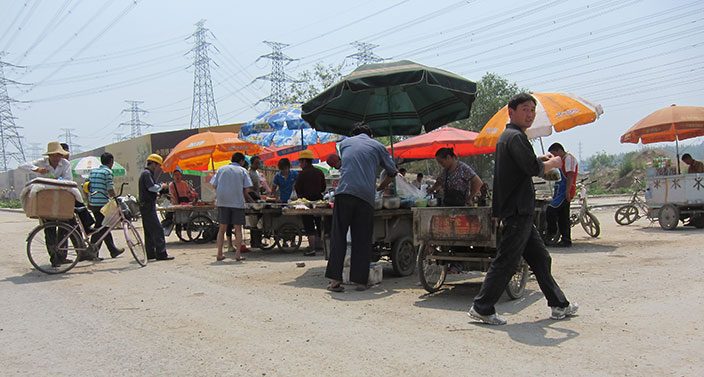
They moved to an inner-city village (cheng zhong cun), essentially a migrant slum, located 20 minutes by bike from the site. There is one bathroom with a long pit for every 100 to 300 of the village’s spare, one-room units. Rent is RMB300 per month.
Mr. Long and Ray return home at 7am. Li Jie tells them about the unusable dumplings. She reminds everyone that they’ve thrown out four bags of dumplings in two days. While we unpack the food from the market, I hear Mr. Long mutter that he doesn’t want to keep doing this, but Lin Ling doesn’t let her husband finish. "Six-thousand kuai, six-thousand kuai, six-thousand kuai, everyone remember that. We have to make this back." She says.
***
I met Li Jie two years ago. She was always outside the same subway stop, her 2-year-old son tied to her back, with all her wares laid out on a large sheet she could roll up at any second if she needed to run. In between selling, she had to breast feed her son and take him to pee and poop in a garbage can nearby.
One time, as I was buying a purse from her, a group of chengguan appeared and started to bark at all the vendors that it was illegal to sell there. I watched one push a young woman down to the ground. Then they started taking the vendors' products. While others were scared and running away, Li Jie showed no anxiety. She told the chengguan in a loud but calm voice so that all the people watching could hear:
“You must have compassion for us migrants, especially for us ethnic minorities. We have no way to make money back home, no schools to send our children to. Just let us sell our stuff. We want to make money in an honest way. We come from the village in the hopes to eat better, you are all city people, so it’s easy for you to have a life here."
The chengguan just stood there. He didn’t hit her, didn’t steal her products or yell back. He walked around aimlessly as everyone scattered.
I helped Li Jie gather her stuff. I told her she was brave to speak up. She said she wasn’t doing anything wrong, that she was just trying to make a living. From then on, we were friends. She allowed me to hang around while she was selling. We would run from the chengguan together and pop into McDonalds together when we needed to use the bathroom. And now Li Jie was letting me hang out with her family for the first days of their dumpling business.
"You must have compassion for us migrants, especially us ethnic minorities. We have no way to make money back home, no schools to send our children to. Just let us sell our stuff."
At 8am I start washing vegetables. Anything involving water takes a long time because there is one faucet for every four homes and every five faucets are connected to one main pipe. So when any one of the 20 families uses their faucet, none of the other 19 can. Someone is always washing vegetables, dishes, hair or clothes. Each family pays RMB10 per person, per month. Peer pressure and faucet scarcity prevents anyone from using too much.
Sometimes we aren’t able to arrive at the construction site in time to sell food because we’re waiting to use the faucet. I’ve learned to stand in the water line and not move until I’ve filled the basin. Since it’s so hard to get water, most food isn’t washed well, it’s soaked. The same water is then used to soak other vegetables. Then the same water is used to scrub the pot. The same bowl is used to wash hair, clothes and Li Jie's child.
Mr. Long chops meat at a small outdoor table that serves as the kitchen. When he walks away, flies descend. You‘d think the meat was one large black stone if you didn’t know hundreds of flies were on top of it.
Around 10am, the gas cooker won’t ignite. After multiple tries, Mr. Long calls the gasman, another unanticipated cost. We don’t wait too long because the gasman lives nearby. By the time he leaves and Mr. Long gets the food cooked it’s 11.30am. We should‘ve left by 11am to be in time for the lunch crowd. We put the beers into the Styrofoam box and load the stools, tables and umbrellas on to the bikes. Li Jie yells at Mr. Long for moving too slowly.
The road to the construction site is narrow and mostly unpaved. Li Jie, Mr. Long and their son go in one bike. I go with Ray. I sit in the back, making sure the bowls and umbrellas don’t fall. My seat allows me to look into the eyes of the impatient honkers in their Mercedes Benz and BMWs. We are all equally stuck on this road.
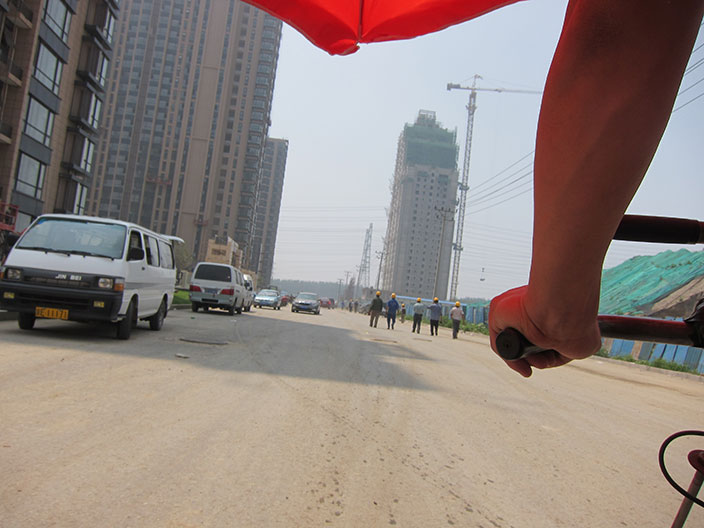
Ray tells me that we live next to a golf course, and many customers prefer to take the back road because it’s faster than the main entrance. We pass by signs announcing new luxury apartments. Pictures of white children with blond hair playing with their parents in green forests pass by our bikes, there aren’t any Chinese faces in the ads.
When we arrive, most of the soup has already spilled out of the pot because of the uneven road. We unload our carts. Hundreds of workers are walking around shirtless. We wait eagerly. "Hot dumpling soup! Get a big bowl of soup!"
Some workers complain after ordering. Some want a beer to compensate for the overcooked dumplings. Mr. Long tries to appease them, "the dumplings are soft because we wanted to cook them long enough so the meat wont get you sick." But we all know why the dumplings are soft. Keeping the soup hot with the gas cooker softens them, so does a freezer that acts like a refrigerator. Mr. Long gives away five beers.
At 2pm, we count the money in Mr. Long's pockets. He has RMB60, which means we only sold 15 bowls. But he gave away five beers, so that leaves him at RMB50. Mr. Long and Li Jie go home with their son who is hungry and needs to nap. I bike with Ray, sitting on the back with the leftover pot of dumplings. The bikes keep running out of battery. Every time this happens, we must push the carts the entire three miles home. Yesterday, Ray and I had to push the cart for two hours after lunch in midday heat.
We get home at 2.30pm without the bikes breaking down. I am relieved. We pull the batteries out and put them on the charger. Li Jie pulls the dumplings off the cart, ladles four bowls of soup and adds cilantro on top. We are so hungry we finish eating within one minute.
At 3.30pm the men leave to buy more vegetables. Mr. Long and Ray return around 4.30pm. We repeat the washing and cooking cycle again. Li Jie makes sure her son is entertained with television and toys.
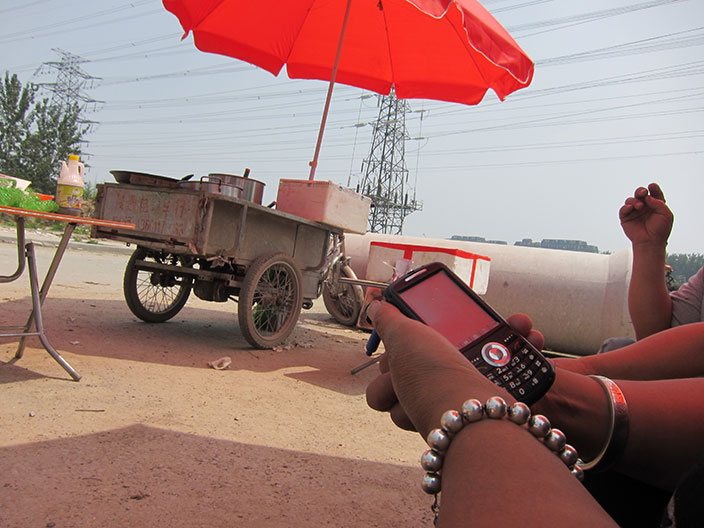
At 5.30pm, we load up the carts again. This time, Ray and Mr. Long try to entice customers by telling them that our bowls are bigger than other vendors, but we don’t charge more. But the other 10 carts have crowds of construction workers while we have none. We all notice, but no one says it.
The sun is setting. We still have a full pot of dumplings. Li Jie suggests we eat some to make us appear to be a popular cart. Mr. Long stands at the cart while Ray, Li Jie and I sit at three different tables, pretending to be customers. After 10 minutes, we all end up at the same table. Everyone is worried. This is day four and we’re still nowhere close to breaking even. It’s almost dark and all of us are starving. We start biking home at 7.30pm.
On the ride home, I ask Ray what his plans are now that their cart isn’t doing well. He tells me that they need more time and when the business is stable in six months, he’ll look for an office job. Ray is 23. He’s the first from his village to go to a top-tier university. He just graduated with an arts degree.
I try to understand why Ray wants to work as a vendor when he just finished college. He explains that he doesn’t have any connections to find office work, and a high starting salary would be around RMB2,000 but no more than RMB3,000. Working as a food seller, he could make RMB500 per day, or at least that’s what he thought based on his friend who’d tipped him to the site.
Ray keeps emphasizing that he isn’t above manual labor. During summer breaks, he worked in a coal mine, a cellphone factory and a restaurant. He doesn’t think an office job is the hallmark of success. His friends who work in offices have to stay 12 hours a day. They’re paid less or the same as migrants and have little freedom. He didn’t feel tied down to an employer, and it was a good feeling.
When we arrive home, Li Jieand Mr. Long prepare dinner by flashlight as Ray and I unload the carts. We put the beers back in the freezer and bring all the chairs inside. I estimate we spend three hours a day loading and unloading the carts.
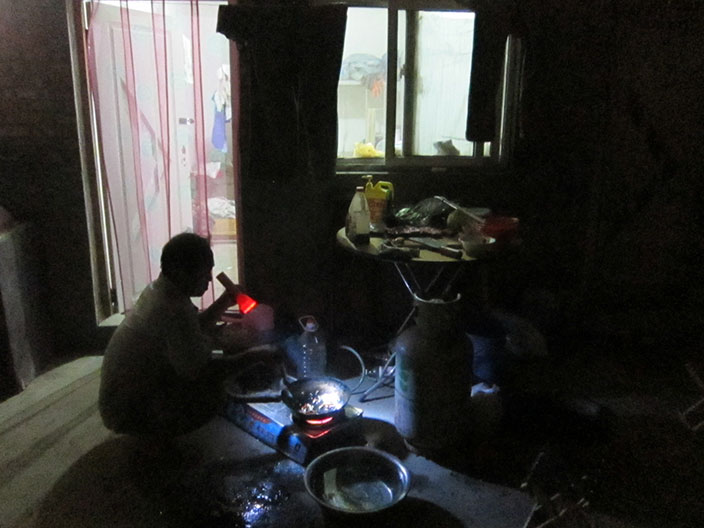
Dinner is ready around 9pm. We have meat. Every day around dinnertime Li Jie says, "We have to start making at least some money so that we can buy food. We need to buy meat." For migrants, eating meat is a symbol of prosperity because for so long villagers could only eat meat a few times a year.
The first days of selling dumpling have been disastrous. The business is only averaging RMB100 per day. Ray keeps reminding the family of his friend's situation and that with time, they’ll also make RMB500 a day. Mr. Long points out that the friend sells good food and has return customers. No one ever comes back to our cart.
Li Jie is getting nervous, but she’s always had the strength to carry the people around her. She wasn’t going to let a few complications or her husband's low morale get in the way of making her investment back. Nevertheless, I can see that everyday activity has begun to wear on all of our bodies.
For me, the hardest part is using the bathroom. When my feet wade through the piles of trash blocking the entrance, I realize the buzzing I hear is a swarm of flies. The odor is like nothing I have ever experienced. I have no words for it. I avoid it as much as possible. In past fieldwork, I’m usually with street vendors who sell in areas where I could pop into a KFC or McDonalds. But here the village bathroom is my only option.
The pit inside is filled to the top with feces, female pads and trash. There is a rotting dog foot in the female bathroom. I want it removed, but I don't know how.
Though I am doing hard labor in 30-degree weather, I am very calculating about drinking water. I sip as little as possible, just enough to moisten my tongue so that it doesn’t stick to the top of my mouth. Yesterday was super hot, but I only used the bathroom twice.
The pit inside is filled to the top with feces, female pads and trash. There is a rotting dog foot in the female bathroom. I want it removed, but I don't know how. I feel bad that other bathroom users have to see it and I feel horrible every time I see it.
Things like this paralyze me because there’s nothing I can do. There’s simply no time or means to make this place cleaner. Everyone feels this way. Everyone wants to remove the trash and dead dog paws. But where do you begin when no one is responsible? Where do you begin when you are exhausted and worried about your next meal?
With a schedule where we wake up at 4am, there is simply no time to do anything but prepare for the next meal or anticipate sleep. Everyone collapses at the end of the day. Every night I bike home thinking: I can’t wait to sleep.
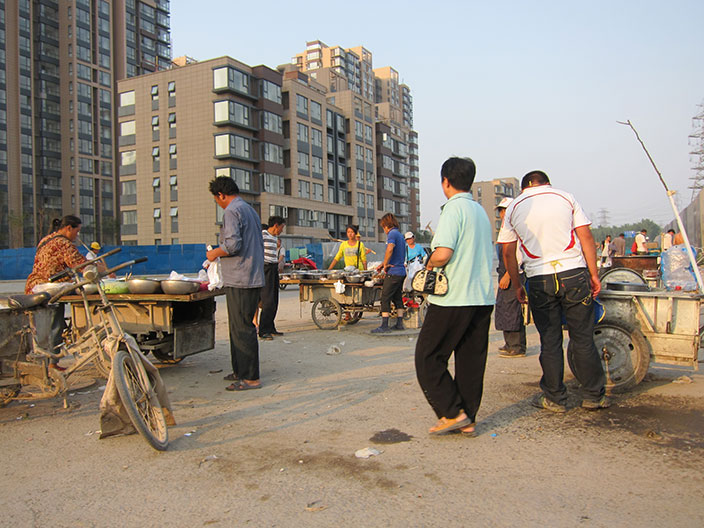
It’s finally 10pm. Most families are asleep so there’s no line at the faucet. I take advantage of the privacy to wet a small towel and wipe the dust and sweat off. I’m shy about wiping down in front of everyone. Since it’s summer, families are always outside. There’s no privacy, but no one else is shy. Li Jie wipes down her armpits, breasts, legs, stomach and butt cheeks in the open.
When I walk inside, Mr. Long and Ray are asleep. Li Jie has made a space for me on the mat next to her and her son. I close my eyes and hope that there are no surprises tomorrow. I hope that the bike batteries work. I hope that the freezer and the gas cooker don’t break. I hope we sell more dumplings.
***
I only stayed with the family a week, but the dumpling stand didn’t last long. Ray convinced a friend from his hometown to join the business. The friend had been working in a cellphone factory and the fumes were making him sick.
A week into their partnership, a knife fell on Ray's heel and sliced his tendon. Ray couldn’t go to a doctor because he didn’t have a city hukou (household registration) so the costs would have been too high. He couldn’t walk for a week.
After that, Ray gave up. He sold everything that they’d bought for RMB6,000 back to the seller for RMB2,000. His friend went back to the cellphone factory. Li Jie and her husband returned to selling clothes on the street. Ray is now looking for work through online websites.
Among street vendors, those with permanent spots are the most well off, especially in touristy or business areas. They usually have stable relationships with local authorities. The most vulnerable are the ones like Li Jie's family, working in a temporary location and not socialized into the unspoken system of payments in exchange for security.
Photos and story by Tricia Wang. Read more about her research at bytesofchina.com.
This article first appeared in the February 2012 issue of That's Shanghai. To see more Throwback Thursday posts, click here.





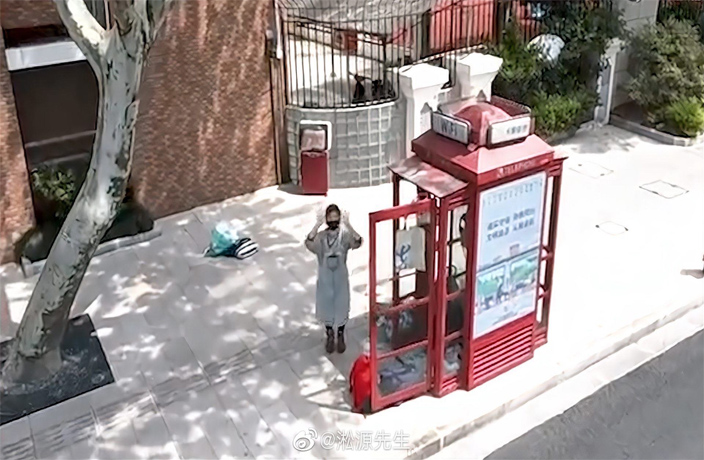
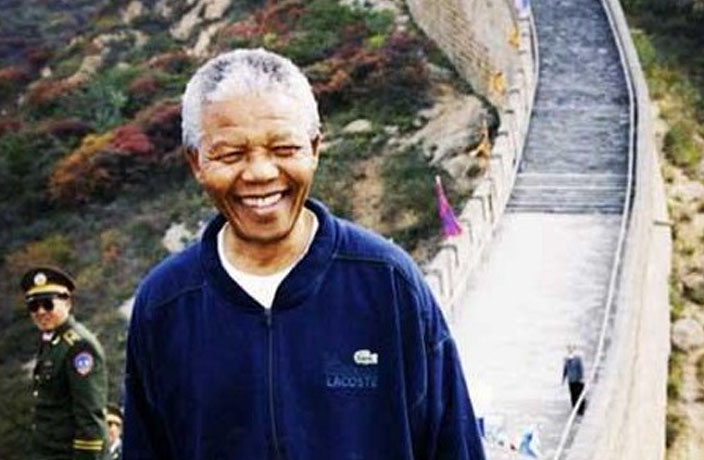















0 User Comments